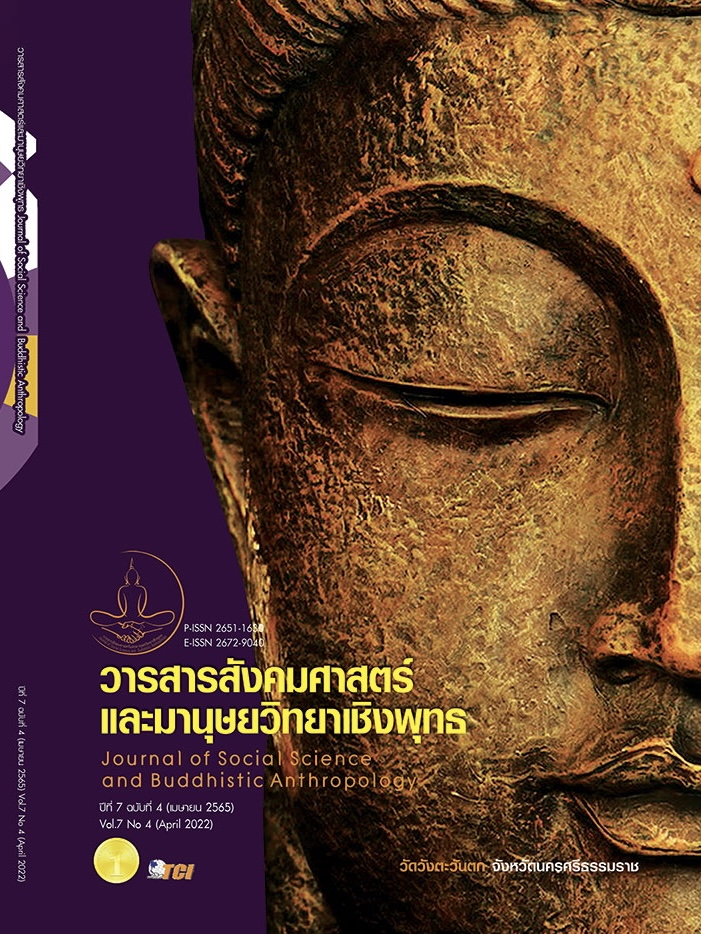DEVELOPMENT OF HEALTH LITERACY MODEL ON LABORATORY RESULTS AND SELF-CARE BEHAVIORS AMONG ELDERLY WITH CHRONIC DISEASES IN THE 9th REGIONAL HEALTH
Keywords:
Health literacy model, Laboratory results, elderly with chronic diseasesAbstract
This research aimed to develop and test a health literacy model on laboratory results for improving self-care behavior of the elderly with chronic diseases in the 9th Regional Health by using Don Nutbeam concept divided into three phases. First Phase: The study of problems and development health literacy model on laboratory results for improving self-care behavior of the elderly chronic disease which was carried out by questionnaires of 372 people and interviewed with 8 chronic disease clinical practitioners. Second Phase: Using health literacy model on laboratory results of 35 people purposive sample group. There were five learning bases workshops between September 1 to November 30, 2020. Third Phase: Evaluation of the health literacy model on laboratory results for improving the self-care behavior of the elderly with chronic diseases, Data were analyzed with Repeated ANOVA and MANOVA. The research results were as follows: 1) Access skill to information at excellent level 2) Cognitive skill at excellent level 3) Interrogation skill at excellent level 4) Decision skill at excellent level 5) Behavior change skill at excellent level. The self-care behavior were 5.1) Exercise at good level; 5.2) Diet and nutrition at medium level; 5.3) Emotional at medium level; 5.4) Smoking and drinking at good level. 6) Telling skill at good level. After using the model and follow-up period, the elderly with chronic diseases had health literacy on laboratory result increased statistically significantly at level of 0.05. The clinical practitioners and the elderly with chronic disease were satisfied with the health literacy model at an excellent level. The responsible agencies should be encouraged the clinical practitioners to manage the Heath literacy model on laboratory results for changing self-care behavior of the elderly with chronic diseases.
References
ไชยยา จักรสิงห์โต. (2560). ประสิทธิผลโปรแกรมปรับเปลี่ยนพฤติกรรมสุขภาพในกลุ่มผู้ที่มีภาวะ ความเสี่ยงสูงต่อการป่วยด้วยโรคเบาหวาน ความดันโลหิตสูงและโรคอ้วน. วิทยานิพนธ์ปริญญาสาธารณสุขศาสตรมหาบัณฑิต มหาวิทยาลัยราชภัฏราชนครินทร์.
นงลักษณ์ เทศนา และคณะ. (2558). ได้ศึกษาเรื่องการพัฒนารูปแบบการป้องกันการป่วย
โรคเบาหวานชนิดที่ 2 ในประชาชนกลุ่มเสี่ยง. สำนักงานป้องกันควบคุมโรคที่ 6 จังหวัดขอนแก่น.
บัณฑิต วรรณประพันธ์. (2561). การพัฒนารูปแบบการดูแลสุขภาพผู้สูงอายุโดยทีมหมอครอบครัวระดับชุมชน ตำบลโนนเมือง อำเภอขามสะแกแสง จังหวัดนครราชสีมา. วารสารวิชาการป้องกันควบคุมโรค. 24(1):65-75.
ปัทมาสน์ เพชรสม. (2558). พฤติกรรมสุขภาพผู้สูงอายุไทย. ปริญญาศิลปศาสตรมหาบัณฑิต สาขา
ประชากรศาสตร์ วิทยาลัยประชากร จุฬาลงกรณ์มหาวิทยาลัย.
ศรีเสาวลักษณ อุนพรมม. (2563). ความรอบรูดานสุขภาพของผูสูงอายุจังหวัดนครราชสีมา.
วารสารสงเสริมสุขภาพและอนามัยสิ่งแวดลอม. ปีที่ 14 ฉบับที่ 33 (2020): มกราคม - เมษายน 2563.
สภาเทคนิคการแพทย์. (2560). มาตรฐานงานเทคนิคการแพทย์ 2560. ฉบับ 60 ปี เทคนิคการแพทย์ไทย.
สำนักงานสถิติแห่งชาติ. (2560). รายงานการสํารวจประชากรสูงอายุในประเทศไทย พ.ศ. 2560.
กลุ่มสถิติประชากร ปีที่จัดพิมพ์ 2561. ถนนแจ้งวัฒนะ เขตหลักสี่ กรุงเทพฯ.
Conbach, L.Joseph. (1984). Essential of Psychology and Education. New York: Mc–Graw Hill
Daniel WW. (2010). Biostatics: Basic Concepts and Methodology for the Health. (9thed). New York: John Wiley & Sons.
Nutbeam, D. (2000). Health literacy as a public health goal: a challenge for
contemporary health education and communication strategies into health
st century. Health Promotion International 2000; 15: 259-67.
Yiengprugsawan, V. Healy, J. and Kendig, H. (Editors) (2016). Health system Responses
to population ageing and noncommunicable diseases in Asia Comparative
Country. Studies WHO 2016 2, (2) pp11- 23.
Downloads
Published
How to Cite
Issue
Section
License
Copyright (c) 2022 Journal of Social Science and Buddhistic Anthropology

This work is licensed under a Creative Commons Attribution-NonCommercial-NoDerivatives 4.0 International License.









